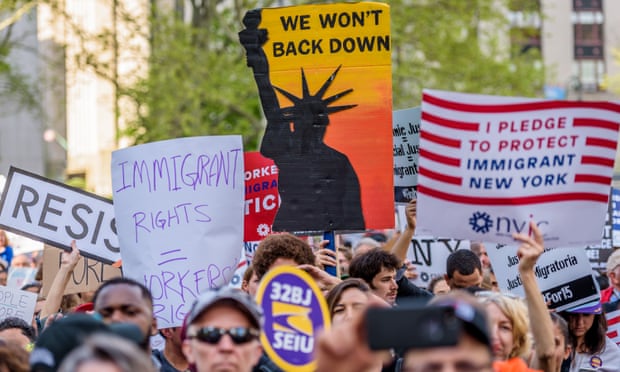- 24 Jun 2017 21:36
#14817938
The Guardian
Sabrina Siddiqui in Washington
The number of refugees admitted to the US has fallen by nearly half under Donald Trump when compared with the final months of Barack Obama’s presidency, according to statistics released by the Department of Homeland Security (DHS).
As the supreme court prepares to consider a White House appeal regarding the president’s ban on refugees and travellers from six Muslim-majority countries, a DHS report published on Friday provided new insight into the state of legal immigration under the Trump administration.
The statistics, first reported by the Los Angeles Times, showed at least 13,000 refugee admissions to the US in the past three months. In Obama’s last three months, that number tipped just over 25,000.
The report pointed to an escalation of refugee intake by the Obama administration around Trump’s win in the presidential election. Compared with the previous fiscal year, the period under Obama reflected an 86% year-over-year increase. Under Trump, there has been a 12% year-over-year drop.
Approximately two-thirds of refugees admitted to the US in the past three months were from five countries: Syria and Somalia, both included in the travel ban; Iraq, which was included in the first version of the ban; the Democratic Republic of the Congo and Burma.
A week after taking office in January, Trump signed an executive order suspending all refugee admissions to the US for 120 days and barring entry for 90 days to immigrants from Iraq, Iran, Libya, Somalia, Sudan, Syria and Yemen. The order prompted nationwide protests amidst scenes of chaos and confusion at many major airports.
The order was blocked in federal court. In March, a revised order removed Iraq from the list and sought to moderate language seemingly directed at Muslims. That order was also ruled against.
The supreme court is expected to rule this week, in its last sitting before a summer-long hiatus. Lawyers representing the Trump administration presented their closing pitch on Wednesday, insisting the travel ban was a counterterrorism measure, within the president’s authority to protect national security. Lawyers for the state of Hawaii and individual plaintiffs in Maryland filed paperwork on Tuesday.
Federal judges who blocked the bans cited harsh rhetoric employed by Trump on the campaign trail, specifically a pledge to ban all Muslims from entering the US and support for giving priority to Christian refugees, as being reflective of the intent behind his travel ban.
Judges also said both the administration and its supporters often employed language while defending the ban that suggested a more nefarious motivation than concern for national security. Rudy Giuliani, the former New York City mayor who was a top campaign surrogate for Trump, told Fox News that Trump called him after the election to ask how he could order a Muslim ban that would pass legal muster.
“I’ll tell you the whole history of it: when he first announced it, he said ‘Muslim ban’,” Giuliani said. “He called me up, he said, ‘Put a commission together, show me the right way to do it legally.’”
In February, an internal DHS report leaked to media outlets undermined the administration’s rationale by finding that citizens from the countries identified in Trump’s travel ban were “rarely implicated in US-based terrorism”.
Trump had been relatively quiet about the ban in recent months, only to return to the issue in the wake of the 3 June terrorist attack in London. Attacking Sadiq Khan, the first Muslim mayor of a major western capital city, Trump tweeted: “That’s right, we need a TRAVEL BAN for certain DANGEROUS countries, not some politically correct term that won’t help us protect our people.”
The tweet undermined once more the administration’s insistence before the courts that the executive order is not a ban but an implementation of a policy of “extreme vetting”. The White House has scolded the media for by calling the order a “ban”, even though the characterization stemmed from Trump himself.
Me, well I used to be known as Plaro....












 - By Tainari88
- By Tainari88